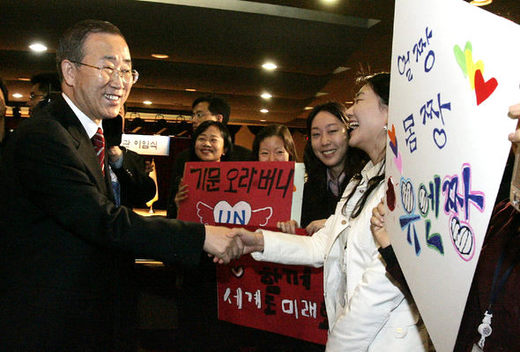 |
|
Ban Ki-moon shakes hands with employees of the Ministry of foreign affairs and trade just after having given a goodbye speech on 10 November.
|
New U.N. secretary-general’s strategic visits paid off
As Ban Ki-moon, the next secretary-general of the United Nations, formally stepped down on November 10 as the South Korean foreign minister, stories behind his campaign have begun to circulate. Ban’s bid to become the U.N. chief was squared away in July last year by Lee Jong-seok, then deputy chief of the National Security Council, now Unification Minister. Government officials say Lee examined the possibility of Ban becoming U.N. head and reported to President Roh Moo-hyun that Ban could hold the post. According to government officials, Lee’s logic behind his bid for Ban was that if a South Korean were to become the U.N. chief, the country may gain a stronger voice over the next five to 10 years in dealing with issues surrounding the Korean peninsula. At the least, Lee thought that a South Korean U.N. chief could prevent worst-case scenarios, according to officials. In addition, Ban becoming the U.N. head is a symbolic event for South Korea’s diplomatic diversification. In late August last year, Roh confirmed Ban’s bid. By February this year, the government had begun to plan Ban Ki-moon’s campaign formally, after asking the media not to report immediately on his candidacy early on in his bid. At first, Ban expanded his opportunity to meet foreign ministers through official and unofficial channels. At the time, some joked, "Ban is traveling everywhere in the world except for the North and South poles." One day, the 62-year-old career diplomat delayed his return home in order to meet government officials in other countries. In another incident, to persuade French President Jacques Chirac, who reportedly said that he would not accept a U.N. chief without French language ability, Ban memorized dialogue in French before meeting Chirac. When the French ambassador to the U.N. called Ban, Ban asked Cheon Young-woo, South Korea’s top negotiator for nuclear disarmament talks on North Korea and fluent in French, to be ready to help him out at a moment’s notice.President Roh campaigned for Ban by extending visits to countries in Latin America and Africa. During summits, Roh allowed Ban to sit next to him, enabling his counterpart to naturally talk about the bid for U.N. leadership. Roh also invited many foreign diplomats to the presidential Blue House. When top diplomats from Sri Lanka visited the presidential residence, Roh was said to say, "Although Sri Lanka has made a bid for the next U.N. chief, help us." One of the toughest hurdles was to get a nod from the United States. A U.S. senator, who is very close to Ban, wrote a letter to U.S. Secretary of State Condoleezza Rice, saying that Ban was very qualified to be U.N. secretary-general. Ban met with U.S. President George W. Bush in September. During a lunch meeting, Bush asked Ban why he was trying to become the U.N. chief. According to people attending the meeting, Ban replied that South Korea became a developing country with the help of the U.N., and that it was time for South Korea to contribute to the international community. South Korea had been worried about a potential intervention by Japan, which wants to become a permanent member of the U.N. Security Council. However, Japan did not prove a big hurdle, as the chill felt between Japan and South Korea during the Koizumi Junichiro administration thawed somewhat with the ascendency of Abe Shinzo, who immediately extended visits to his counterparts in China and South Korea. However, some presidential officials and diplomats called for Ban to step down as foreign minister to better campaign for the post, while others worried that if he were to resign too early, he may have forfeited his chances for being elected U.N. secretary-general. Ban chose to remain in office, saying, "If I resign, it will be difficult for me to meet other nations’ foreign ministers." In May this year, Roh, too, decided to keep Ban in his ministerial post during the visit of both to the Middle East. [englishhani@hani.co.kr]






